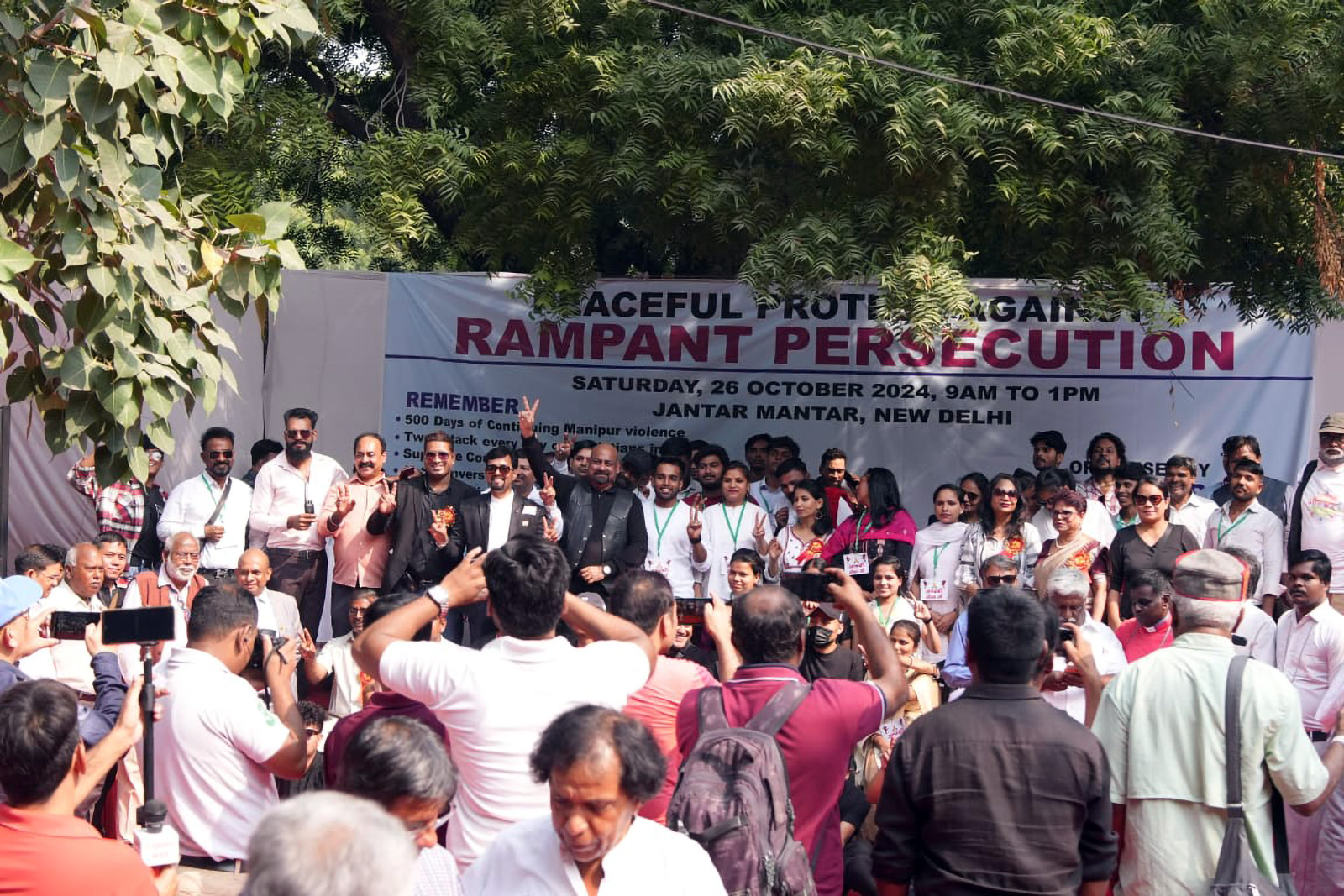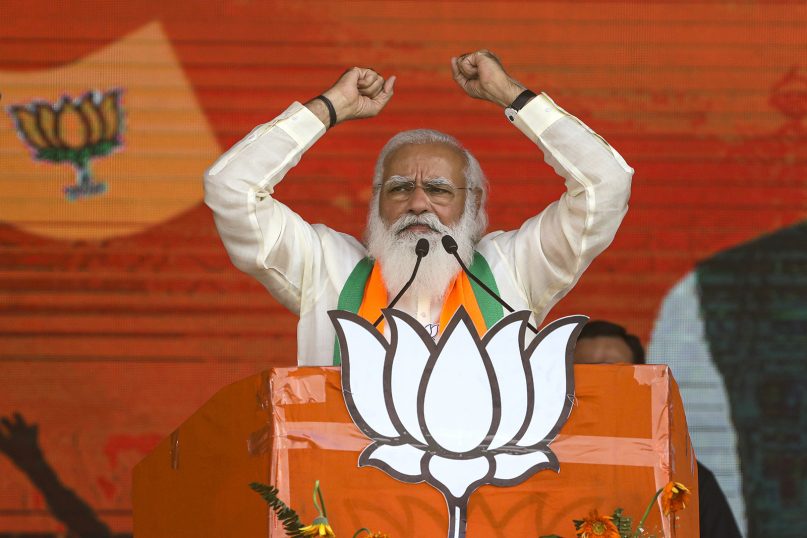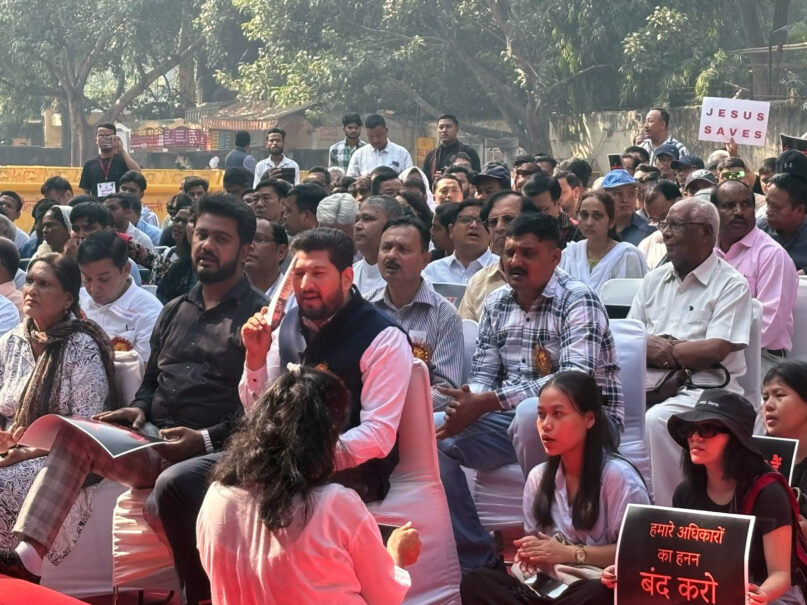
NEW DELHI (RNS) — In July, more than two years after a Christian prayer service at his home was raided by police, a court in Uttar Pradesh in northern India acquitted Abhishek Gupta, a 41-year-old radiologist, of violating the state’s anti-conversion law.
Legally, his victory was more than a win; it was a rout: The judge in the case cleared Gupta and a co-defendant of trying to recruit Hindus into Utter Pradesh’s tiny Christian minority, but further ruled that the complainant, a member of a Hindu nationalist activist group, was not eligible to file the case and that police investigators were “the real culprits.”
But personally, the case has ruined Gupta, he said. “My entire family is Christian. I pray on Sundays. I don’t know why anyone would think I was converting anyone,” Gupta told RNS by phone from his home village in Gorakhpur, where he moved after he and his wife, a nurse, were asked to resign their jobs for fear their employers would be harassed by vigilantes. “We exhausted our life savings, and our life was turned upside down,” he said.
A study by Article 14, a watchdog group, revealed that in the first year after the original 2021 statute passed, half of the 101 reported violations came from third parties. Most of the third parties were Hindu nationalist outfits that were using the law to harass Christians.
Gupta plans to file a civil case against the police and the Hindu nationalist group, called Hindu Jagaran Manch, that accused him. But the day Gupta was acquitted, the Uttar Pradesh government passed a series of amendments to the conversion statute, making converting others a crime punishable by life imprisonment, and empowering third parties to file complaints.

In this March 7, 2021, file photo, Indian Prime Minister Narendra Modi addresses a public rally in Kolkata, India. (AP Photo/Bikas Das, File)
India Prime Minister Narendra Modi and his ruling Bharatiya Janata Party, are often accused of advancing Hindutva, a political ideology usually referred to as Hindu nationalism, that seeks to empower the country’s Hindu majority while relegating Muslims and Christians to second-class citizens. The BJP has historically presented Christians as a threat because of their history of missionary work in the country.
The BJP and the Hindutva group RSS that gave birth to the political party have historically accused evangelical Christian missionaries of misusing medical and educational welfare efforts to convert India’s vulnerable tribal and Dalit populations.
Eight of India’s 28 states have passed laws banning conversions, including Modi’s home state of Gujarat and Uttar Pradesh, whose chief minister, Adityanath, is a prominent yogi and a Hindu nationalist.
While they purport to protect poor Hindus from being exploited, anti-conversion laws have been found to have a more demonstrable effect of generating violence against Christians.
A 2019 paper by Nilay Saiya and Stuti Manchanda, professors of public policy and global affairs at Nanyang Technological University in Singapore, showed that the states that enforce anti-conversion laws are statistically more likely to give rise to violent persecution against Christians than states that have no such laws.
In 2003, allegations of conversion led to the brutal murder of Australian Christian missionary Graham Stains and his two young sons, Philip and Timothy, who were burned alive by members of Bajrang Dal, an RSS affiliate.
There have been 733 incidents of violence against Christians in the past two years, according to the United Christian Forum, with 585 such incidents through September of 2024 alone. Most have been spurred by false allegations of conversion.

Leaders and hundreds of followers from various Christian denominations gather for a protest in New Delhi, India, on Oct. 26, 2024, objecting to what they describe as a mounting pattern of harassment, persecution and violence directed at India’s Christian minority. (Photo courtesy United Christian Forum)
UCF officials told RNS they are preparing to meet with senior ministers in the Modi government to request that the government issue an advisory to the state governments to repeal the anti-conversion laws.
Pramod Singh of the Christian Legal Association, which has been overseeing the legal defense of hundreds of Christians across India, called the amendments to the UP anti-conversion law “absolute madness.”
“Can a citizen of India be harassed by a mob like this?” he said. “Now, anyone can barge inside your home with the police, accusing you of converting people when you are praying in the privacy of your home.”
He said the law imposes undue limitations on individuals’ ability to choose their faith and puts the onus of proving their innocence on the accused, not the police or the complainants.
But Vivek Premi, a BJP official in Uttar Pradesh, defended the law on religious freedom grounds. “Everyone has a right to pray as per their religious tradition, but it is totally unacceptable to use your way of praying to lure anyone and convert them.”
Premi, a former member of the Hindu nationalist youth organization Bajrang Dal, has used WhatsApp and Facebook to create a network of hundreds of volunteers who alert him of conversion.
The National Council of Churches of India has strongly objected to the new Uttar Pradesh measure, saying it violates the Indian Constitution, which supports religious freedom of Indian citizens.
The Rev. Asir Ebenezer, general secretary of NCCI, said the amendment encroaches on the constitutional right to freely practice and profess religion, a fundamental human right recognized by the Indian Constitution.
The UP government, however, described the ordinance as a “good legislation” necessary to “check cases of deceitful, fraudulent and forceful conversions.”
A senior state official told RNS, “The law does not espouse any motive to single out any religion or faith. Such legislation was necessary to prevent only those marriages that are done with the sole purpose of conversion. The law, in fact, safeguards human rights by preventing fake, fraudulent or deceitful premises of marriage.”
